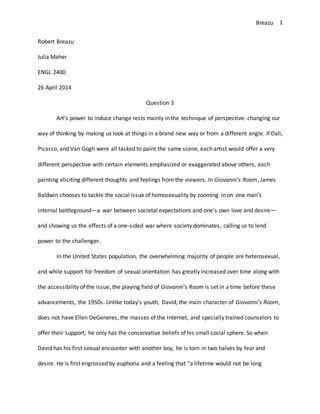
Giovanni's Room
- 1. Breazu 1 Robert Breazu Julia Maher ENGL 2400 26 April 2014 Question 3 Art’s power to induce change rests mainly in the technique of perspective: changing our way of thinking by making us look at things in a brand new way or from a different angle. If Dali, Picasso, and Van Gogh were all tasked to paint the same scene, each artist would offer a very different perspective with certain elements emphasized or exaggerated above others, each painting eliciting different thoughts and feelings from the viewers. In Giovanni’s Room, James Baldwin chooses to tackle the social issue of homosexuality by zooming in on one man’s internal battleground—a war between societal expectations and one’s own love and desire— and showing us the effects of a one-sided war where society dominates, calling us to lend power to the challenger. In the United States population, the overwhelming majority of people are heterosexual, and while support for freedom of sexual orientation has greatly increased over time along with the accessibility of the issue, the playing field of Giovanni’s Room is set in a time before these advancements, the 1950s. Unlike today’s youth, David, the main character of Giovanni’s Room, does not have Ellen DeGeneres, the masses of the Internet, and specially trained counselors to offer their support; he only has the conservative beliefs of his small social sphere. So when David has his first sexual encounter with another boy, he is torn in two halves by fear and desire. He is first engrossed by euphoria and a feeling that “a lifetime would not be long
- 2. Breazu 2 enough…to act with Joey the act of love” (Baldwin 8), but this soon gives way to an intense fear, seeing the experience as “the black opening of a cavern in which [he] would be tortured till madness came…full of rumor…full of dirty words” (Baldwin 9). In this first battle, fear wins out over love, sending David on a path away from the boy and scarring him for the rest of his life. By constructing this rigid dichotomy between societal desires and personal desires with joyfulness set beside imagery of dark, frightening caverns, Baldwin gives us an insight into the experience of homosexuals and the divide they must struggle with. Through David’s relationships and direct testimony from Jacques, a man who fills a father figure sort of role in David’s life, Baldwin also shows the result of the war if the frightening caverns surrounding the social image of homosexuality are successful in continually stifling the efforts of love and desire. Baldwin uses Jacques to capture this devastating result, one of dirty and shameful relationships with “no affection in them, and no joy…like putting an electric plug in a dead socket” (Baldwin 56). Jacques warns David to not allow fear overtake him, but instead to instill joy into his relationships and accept them, lest he risk becoming just like Jacques himself, “trapped in [his] own dirty body, forever and forever and forever”(Baldwin 57) with no hope of escape. In a war, the losing side has a number of options. They can give up early on and submit to command from the winning side, but for homosexuals, giving up is not an option—it would be impossible, akin to tearing out one’s own heart and expecting to live afterwards, one’s sexual orientation being something irremovable. The other, even more heart-wrenching options are total annihilation—suicide—or a crushing defeat with a severely depleted population left behind to suffer. By not heeding Jacques’ advice and not putting up a real fight,
- 3. Breazu 3 David falls within the third option—crushing defeat, his “heart growing cold with the death of love” (Baldwin 158). Even trying to go along with the expectations of society and attempting to keep hold on his fiancé, Hella, he is unsuccessful, unable to maintain any link to her, “[watching] [his] body in a stranger’s arms” (Baldwin 162) on his penultimate night with Hella. By letting his fears control him, David is left with nothing and is left feeling nothing, his fears leading him to a place worse than what he thought he was avoiding. With Jacques’ warnings and David’s downfall, Baldwin paints a fate that is ultimately darker, emptier, and more frightening than the caverns of dearth and depravity that the majority of society portrays homosexuality as. With Baldwin’s personal history closely matching David’s—he too left the US for Paris in an attempt to find himself, though he was successful where David failed—we can draw his message to the readers, the viewers of his art piece, directly from the characters in the novel. To the homosexual viewers, Baldwin’s message is along the lines of Jacques’ warning: do not be afraid. For those who might be going through what David goes through, he encourages them to embrace their sexuality, painting the dark depths that one reaches through avoidance as the only alternative. For the rest of us, he paints a scene that inspires a tempestuous sadness; telling us through the story, “look upon the destruction ye have wrought.” His call is for us to relieve the pressure, to remove these societal expectations of sexuality and allow people to embrace their sexuality without fear of ostracism, prejudice, and aggression. Fortunately, we have made much progress today, but with people still out there resisting, the message still resounds, hoping to one day change everybody’s view on the issue of sexual orientation and transform it into a non-issue.
- 4. Breazu 4 Works Cited Baldwin, James. Giovanni's Room. New York: Dial, 1956. Print.